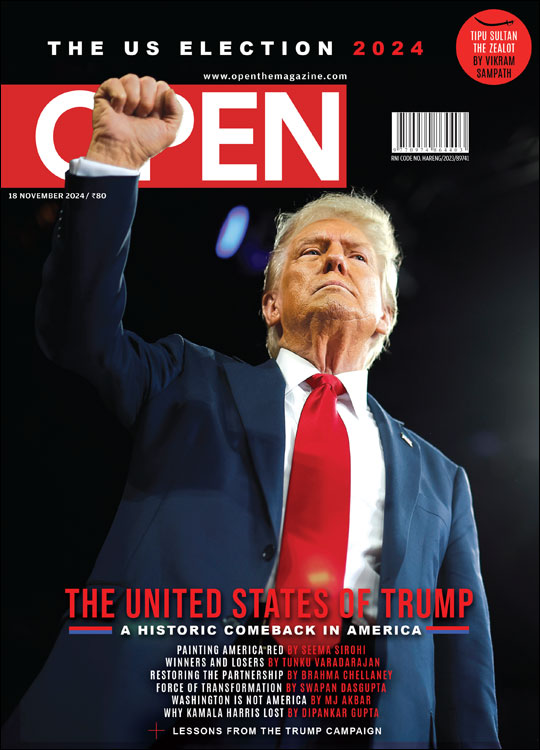/wp-content/uploads/2017/11/Dollarguardian.jpg)
MONEY, LOTS AND lots of it, makes a lot of people sleepless. Indians are among the world’s worst afflicted and popular sympathy these days is inversely proportional to how high they figure on a ‘Paradise’ list. But spare a thought for the man whose sleep has just been put at threat by the largest sum of money under any individual’s charge since the dawn of civilisation. It’s legitimate, this dough, and will soon be under the oversight of Jerome Powell, an American who has been appointed by US President Donald Trump to replace Janet Yellen as chief of the Federal Reserve. At stake is not just his own stress, but that of investors and business folk across the world who could be left bleary-eyed by what he does (or does not) do with the US central bank’s dollar policy. Indians need to pay attention too. While India’s economy is said to have ‘decoupled’ from the West’s, it gets to escape neither the world’s boom-and-bust cycles nor the Fed’s ease-and- tighten sequences that push domestic asset values up and down.
As it turns out, Powell is not an economist, at least not by way of formal education. This is a good thing, some would argue, in today’s scenario. What counts is an open mind with a clear grasp of diverse perspectives and a knack for working out a consensus, and that’s what the 64-year-old banker has reportedly earned a reputation for. This was observed not just in the five years he spent as a governor on the Fed Board before his elevation, but even earlier as a finance wonk at Bipartisan Policy Center, a think-tank. He has had government experience at the US Treasury Department under the George W Bush administration and is seen as a Washington insider of sorts, though perhaps the most rewarding part of his career has been as an investment banker. His net worth is estimated at over $50 million, the bulk of it made at an influential private equity firm—and Saudi favourite—called Carlyle. Given the wide spectrum of expertise that top-level wealth management takes, it’s not too peculiar a choice of profession for a Princeton student of Politics who studied Law after that at Georgetown University. As with other things, monetary policy has been a matter of on-the-job learning more than textbook theory for him. The temperament of a central bank chief is assumed to be of some significance too, and Powell’s mountain bike and guitar go squarely in his favour on that one. He once even played for a band called Moneypennies, a name meant not to be prophetic but convey its aim of passing a hat around for the needy. He is married to a filmmaker, Elissa Leonard (who made the 2015 Sally Pacholok starring Annet Mahendru), which only adds to his widely-affirmed credentials as a cool guy with collegial ways.
Analysts expect no sharp policy shifts with Powell at the Fed’s helm. Apart from his earlier unease over the scale of Ben Bernanke’s Quantitative Easing in response to the credit seizures of 2008-09, he has mostly gone along with the bank’s flow. This may not be a good thing for the dollar, though. After all, a currency cannot be kept in perpetual crisis mode, as the greenback has been since the Great Recession, without a price to be paid for it. Wads and wads of it have effectively been let loose across markets worldwide by the Fed’s frantic buying of bonds aimed at easing public access to funds even beyond what a zero-rate policy assures. The grand easing of America’s previous panic over a credit-cardiac arrest, post-9/11, had bloated all kinds of assets out of proportion—including the subprime sort that splattered the scene with rotten loans once they burst. What the post-Recession round will do is anybody’s guess.
Not that the Fed hasn’t tried to tighten the availability of money. It has. Aware of the dangers, it has offloaded a few bonds and raised rates, but only in fits and starts, resisted at each juncture by markets that get jittery at the very mention of a stimulus withdrawal. Markets are still too weak for this, say some. Too greedy, say others. The former appear to prevail rather too often, arousing fears of a policy held captive by unseen forces; of a Fed being reckless with a currency that gave up its gold peg back in 1971; and of a dollar vulnerable to a crash caused by, say, a selloff in the East.
What Powell makes of all this would be watched closely the world over. It’s a risk that has more than a trivial bearing on US leadership of capitalism, something that hasn’t inspired much confidence lately. But then, who better than a lawyer turned investor turned governor to address it?

/wp-content/uploads/2024/11/Trump-Cover.jpg)








/wp-content/uploads/2024/11/ROHIT-SHARMA.jpg)
/wp-content/uploads/2024/11/1.jpg)
/wp-content/uploads/2024/11/Stargazer2.jpg)

More Columns
Trepidation or Hope: India Goes to Australia, Battered and Bruised by New Zealand! Short Post
Old Silk Route Hub Looks to Rekindle Indian Connections Ajay Kamalakaran
Shonali Bose and the Art of Dying Kaveree Bamzai